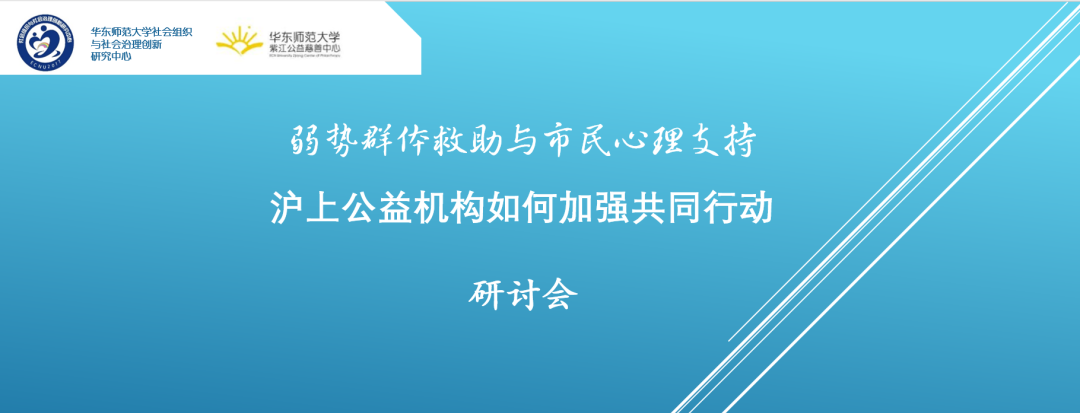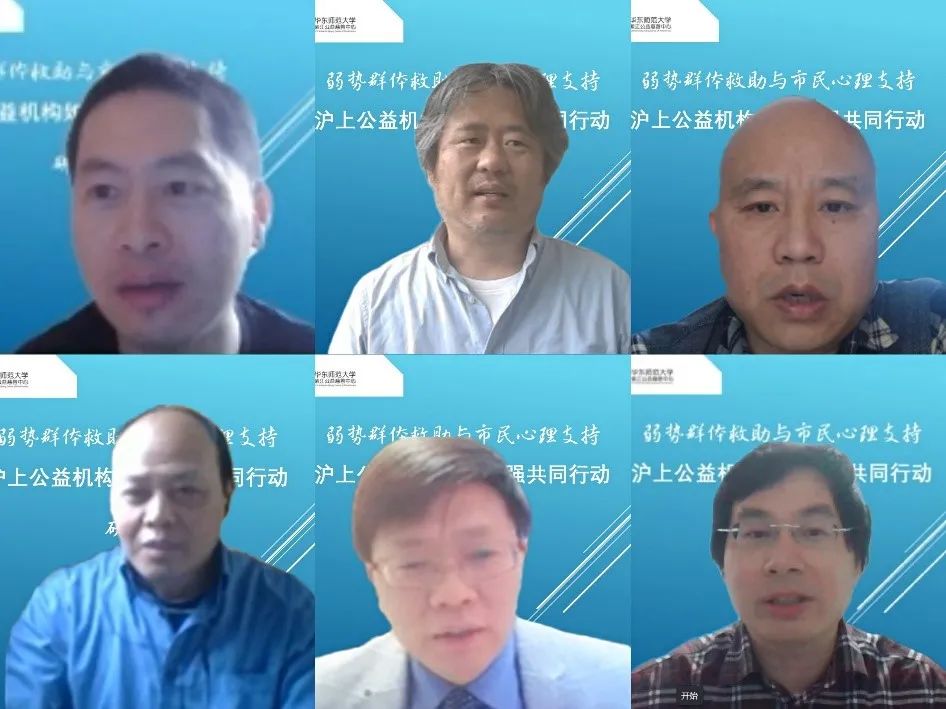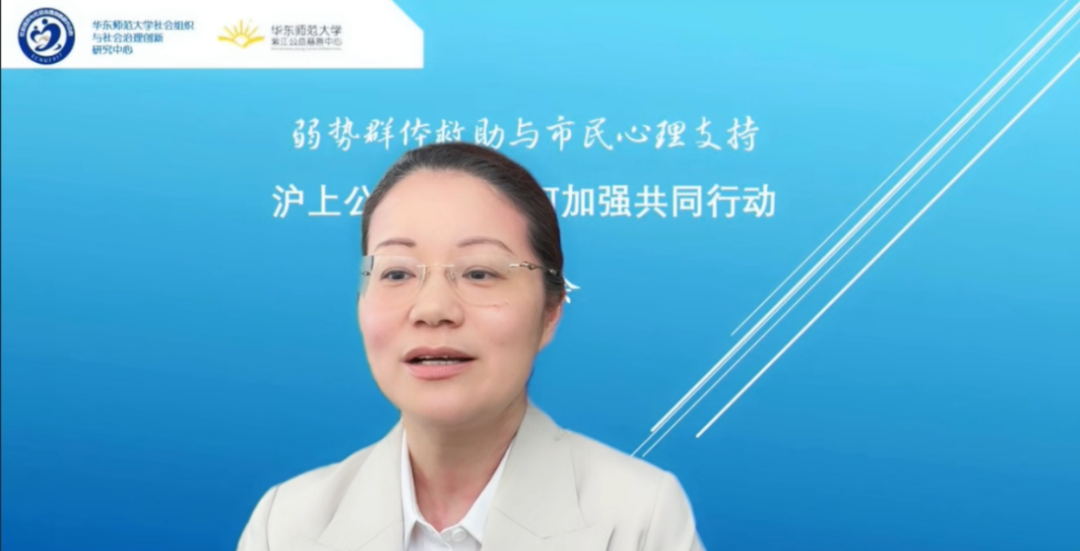"Vulnerable Group Relief and Citizens' Psychological Support: How to Strengthen Common Actions for Shanghai-based Public Welfare Organizations" Symposium Successfully Held
On the morning of May 13, the "Vulnerable Group Relief and Citizens' Psychological Support: How to Strengthen Common Actions for Public Welfare Organizations in Shanghai", jointly sponsored by East China Normal University Social Organization and Social Governance Innovation Research Center and East China Normal University Zijiang Charity Center, was online. held successfully. A total of 30 people from social organizations, front-line workers, teachers and students from colleges and universities participated in the meeting, focusing on "what work has public welfare organizations carried out in terms of helping vulnerable groups, citizens' psychological comfort and support" and "whether public welfare organizations can be further


strengthened." Wang Wanxin, Secretary General of Shenzhen-Shanghai Rende Public Welfare Foundation, participated in a discussion on issues such as joint action and what support universities can provide. Professor Zhou Jun from the Innovation Research Center for Social Organization and Social Governance of East China Normal University presided over the meeting.
Wang Wanxin, Secretary General of Shanghai Rende Public Welfare Foundation, Hao Nan, Founder of Zhuoming Disaster Information Service Center and NCP Life Support Network, Sun Haiyan, Co-founder and Editor-in-Chief of Business Ecology Studio, Zhang Weiqiong, Director of Public Participation Department of Shanghai Lianquan Public Welfare Foundation , Xu Jun, Captain of Shanghai Sanqi Emergency Rescue Team, Zang Rui, Director of Oak Marriage Service Center in Minhang District, Shanghai, Liu Songjie, Shanghai Baiyulan Happy Home Family Service Agency, Tang Youcai, School of Social and Public Administration, East China University of Science and Technology, Shanghai International Studies University 11 guests including Associate Professor Yu Zucheng from the School of Business Affairs, Associate Professor Song Chengcheng from the School of Public Economics and Management of Shanghai University of Finance and Economics, Professor Huang Chenxi from the School of Social Development of East China Normal University, Associate Professor Zhang Qi from the School of Psychology and Cognitive Sciences of East China Normal University, and Associate Professor Weng Shihong from the School of Public Administration of East China Normal University He shared his work and thoughts on assistance to vulnerable groups and psychological support for citizens during the COVID-19 outbreak in Shanghai.
Guests from public welfare organizations introduced various relief measures and actions of the organization during the epidemic. For example, the Rende Foundation provided living materials for the elderly living alone and migrants through platform procurement and errands. Zhuoming Disaster Information Service Center provides services such as online consultation, psychological consultation and community assistance through multi-party joint actions. The business ecology studio disseminates professional knowledge in the form of an online breakfast meeting. The Shanghai Lianquan Public Welfare Foundation launched the "Protection of Shanghai Anti-epidemic Relief Special Action" at the first moment of the outbreak to provide support for communities, units, residents and anti-epidemic workers. The Shanghai Amphibious Rescue Team gave full play to its professional advantages in emergency rescue and epidemic prevention services, and devoted itself to the disinfection of the outdoor environment as soon as possible. The Oak Marriage Service Center in Minhang District, Shanghai began to provide public welfare psychological assistance services in the early days of the epidemic, and has now formed a team of more than 100 professional consultants.
Guests from colleges and universities shared their thoughts on building a local community assistance network, building a public welfare information sharing platform, promoting information openness and transparency, and promoting public welfare alliances based on their

own observations and experience of volunteering in epidemic prevention and control. (From left to right: Wang Wanxin, Hao Nan, Sun Haiyan, Zhang Weiqiong, Xu Jun, Zang Rui)
 (From left to right: Tang Youcai, Huang Chenxi, Zhang Qi, Weng Shihong, Yu Zucheng, Song Chengcheng)
(From left to right: Tang Youcai, Huang Chenxi, Zhang Qi, Weng Shihong, Yu Zucheng, Song Chengcheng)
Afterwards, the guests had an interactive discussion, and proposed that social organizations need to sink into the community, enhance the ability to connect with the streets and community committees, build a social network for public welfare actions, and jointly carry out joint actions; colleges and universities should play an active role in building information Sharing platform, encouraging college student volunteers to participate and other highly inspiring views.
 (Fan Jiayan, Deputy Secretary General of Shanghai Zijiang Foundation)
(Fan Jiayan, Deputy Secretary General of Shanghai Zijiang Foundation)
Finally, Fan Jiayan, Deputy Secretary-General of Shanghai Zijiang Foundation, summarized the meeting. She pointed out that the epidemic has shown us the uncertainty and complexity of the mega-city Shanghai facing a sudden public crisis, and it has also shown us the contribution of non-profit organizations that have always been active. She said that Zijiang Foundation will continue to do its best to cooperate with public welfare and university partners.
